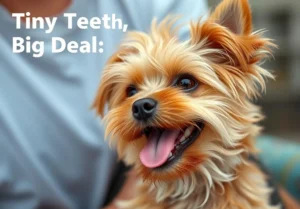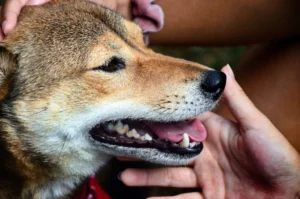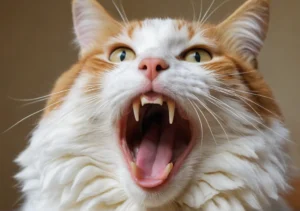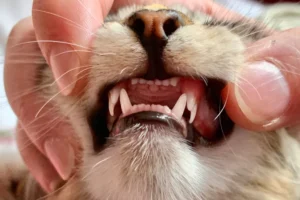Have you ever noticed your cat dribbling more than usual and wondered why? Let’s uncover the reasons behind this unusual behavior.
Cats drool or dribble for various reasons, including dental issues, excitement, or even anxiety. Understanding why your feline friend is drooling excessively can help you address any underlying concerns.
Dental Problems
Cats can dribble a lot due to dental issues. Just like humans, oral health is crucial for our feline friends. Tooth decay, gum disease, or mouth infections can lead to excessive drooling. Regular dental check-ups with your vet can help identify and treat any problems early on. Brushing your cat’s teeth can also prevent dental issues. Dental treats or toys designed to clean teeth can be helpful too. Remember, a healthy mouth means a happy cat!
Excitement or Stress
Exciting events or stressful situations can also cause your cat to dribble excessively. Whether they’re anxious, nervous, or overly stimulated, drooling can be a sign of their emotions. Creating a calm environment for your cat and limiting exposure to stressful stimuli can help reduce drooling. Interactive toys, comforting scents, or a cozy hiding spot can all aid in calming your furry friend. Remember, a relaxed environment equals a content cat!
Potential Health Concerns
If your cat is drooling excessively, it could be a sign of underlying health issues. Dental problems such as gum disease or tooth decay can cause increased drooling. Oral ulcers or mouth infections can also lead to dribbling. Additionally, kidney disease or poisoning can manifest as drooling in cats. If you notice other symptoms like vomiting, lethargy, or loss of appetite, it’s crucial to seek veterinary care promptly to address any potential health concerns your furry friend may have.
Foreign Objects
Did you know that foreign objects stuck in your cat’s mouth could be the reason for excessive drooling? Cats are curious creatures and may accidentally ingest small items that get lodged in their oral cavity, causing discomfort and increased saliva production. If you suspect a foreign object is causing your feline friend to drool excessively, it’s essential to gently examine their mouth and try to safely remove any obstructions. However, if you encounter any difficulty or your cat shows signs of distress, seek professional help from your veterinarian to avoid causing harm.
Additional Unique Insight: – A common foreign object that may cause drooling in cats is a blade of grass. Cats may nibble on grass, leading to a piece becoming stuck in their teeth or throat, triggering excessive drooling. Keep an eye out for this potential culprit if your cat enjoys outdoor adventures.
Anatomical Abnormalities
Certain anatomical abnormalities in your cat’s mouth or throat can lead to excessive drooling. For example, issues with the salivary glands or abnormalities in the structure of the mouth or throat can cause your cat to dribble more than usual. In some cases, dental problems such as a fractured tooth or gum disease can also result in increased drooling. It’s important to consult with your veterinarian to identify any underlying anatomical issues and determine the best course of action to address them effectively.
Medication Side Effects
Some medications can have drooling as a side effect in cats. Common culprits include certain antibiotics, pain medications, or medications used to treat conditions like nausea or anxiety. If you notice your cat drooling excessively after starting a new medication, it’s essential to consult your vet. They can evaluate the situation and potentially adjust the dosage or switch to a different medication to alleviate the drooling. Remember, always follow your vet’s guidance when it comes to managing medication side effects in your feline friend.
Tips for Managing Medication-Induced Drooling:
- Stay in Touch with Your Veterinarian: Keep your vet informed about any changes in your cat’s drooling patterns.
- Observe Closely: Monitor your cat’s drooling closely after starting a new medication to catch any issues early.
- Provide Water: Ensure your cat has access to fresh water to help flush out any excess drool.
- Adjust Dosage: Work with your vet to adjust the medication dosage if drooling persists.
- Consider Alternative Medications: If drooling becomes a persistent issue, ask your vet about alternative medications with fewer side effects.
Remember, understanding the underlying reasons for your cat’s excessive drooling is crucial in providing the best care and ensuring your furry companion’s overall health and well-being.
Extra Care for Senior Cats
As cats age, they may experience changes that lead to increased drooling. Senior cats often have dental issues, such as gum disease or tooth decay, which can cause excess saliva production. Additionally, older cats may have less control over their facial muscles, resulting in more dribbling.
To provide extra care for senior cats who drool a lot, it’s essential to schedule regular dental check-ups with your veterinarian. They can address any dental problems that may be contributing to the excessive drooling. You can also try incorporating wet food into their diet, as it can be easier for them to eat and reduce drooling.
Additionally, ensure your senior cat stays hydrated to prevent dehydration, especially if they are drooling excessively. Offer fresh water daily and monitor their water intake. Providing a warm and comfortable environment for your senior cat can also help reduce stress, which can be a factor in increased drooling.
Remember, senior cats may need extra TLC as they age, so be patient and understanding as you care for your furry friend in their golden years.
Fun Facts About Cat Drooling
Did you know that cats use drooling as a way to mark their territory? When cats drool, they release pheromones that signal to other animals that the area belongs to them. So, if your cat is dribbling a lot, they might just be claiming you as their own!
Contrary to popular belief, not all cats drool due to stress or anxiety. Some cats naturally drool more than others, especially when they are feeling content and relaxed. This can be a sign of affection and trust, as your cat feels safe and secure in your presence.
To add to the feline fun facts, some cat breeds are more prone to drooling than others. Breeds such as Persians, Maine Coons, and Siamese cats are known to be more droolers than their counterparts. So, if you have one of these breeds, don’t be surprised if they leave a little puddle of drool behind!
Remember, if your cat’s drooling suddenly increases or is accompanied by other symptoms like lethargy or vomiting, it’s essential to consult your veterinarian to rule out any underlying health issues.
Extra Tip: If your cat drools excessively during car rides or vet visits, try placing a calming pheromone spray in their carrier to help reduce anxiety and drooling.
Why Does My Cat Drool So Much?
If you’ve ever wondered why your feline friend seems to be drooling excessively, you’re not alone. Cat drooling can be caused by a variety of reasons, including dental issues, stress, excitement, or even certain medical conditions. Some cats may drool more than others due to their breed or individual temperament. However, if you notice a sudden increase in drooling or other concerning symptoms, it’s always best to consult with your veterinarian to rule out any underlying health issues.
One common reason for excessive drooling in cats is dental problems. Just like humans, cats can experience issues with their teeth and gums, leading to discomfort and drooling. Tooth decay, gum disease, or oral infections can all contribute to increased saliva production and drooling in cats. Regular dental check-ups and proper oral hygiene can help prevent and address these issues, keeping your cat’s mouth healthy and drool-free.
Another potential cause of cat drooling is stress or anxiety. Cats are sensitive creatures and can become stressed in response to changes in their environment, such as moving to a new home or the addition of a new pet. Stress can manifest in various ways, including excessive drooling. Creating a calm and comfortable environment for your cat, providing plenty of hiding spots and enrichment, and offering reassurance can help reduce their stress levels and minimize drooling.
In some cases, excitement can trigger drooling in cats. Just like when we anticipate a delicious meal or a fun activity, cats can become overly excited and drool as a result. This is usually nothing to worry about and is simply a natural response to heightened emotions. Ensuring your cat has plenty of opportunities for play and mental stimulation can help channel their excitement in a positive direction.
If you notice that your cat is drooling excessively and it’s accompanied by other concerning symptoms such as lethargy, vomiting, or difficulty eating, it’s crucial to seek veterinary attention promptly. These signs could indicate an underlying medical issue that requires treatment. Your veterinarian can perform a thorough examination and diagnostic tests to determine the cause of your cat’s excessive drooling and recommend the appropriate course of action.
Remember, every cat is unique, and what may be normal for one cat might not be for another. By understanding the potential reasons behind your cat’s excessive drooling and taking proactive steps to address any underlying issues, you can help keep your feline friend happy, healthy, and drool-free.
Conclusion
In conclusion, cat drooling can have various causes, including dental problems, stress, excitement, and medical conditions. Understanding why your cat might be drooling excessively is the first step in addressing the issue. Maintaining your cat’s dental health, creating a stress-free environment, and monitoring their overall well-being are key to managing their drooling behavior. Remember, if you have any concerns about your cat’s drooling, don’t hesitate to consult with your veterinarian for guidance and support. By staying proactive and attentive to your cat’s needs, you can help ensure they lead a happy and healthy life.
Alex, a passionate animal lover, has experience in training and understanding animal behavior. As a proud pet parent to two dogs and three cats, he founded AnimalReport.net to share insights from animal experts and expand his knowledge of the animal kingdom.




